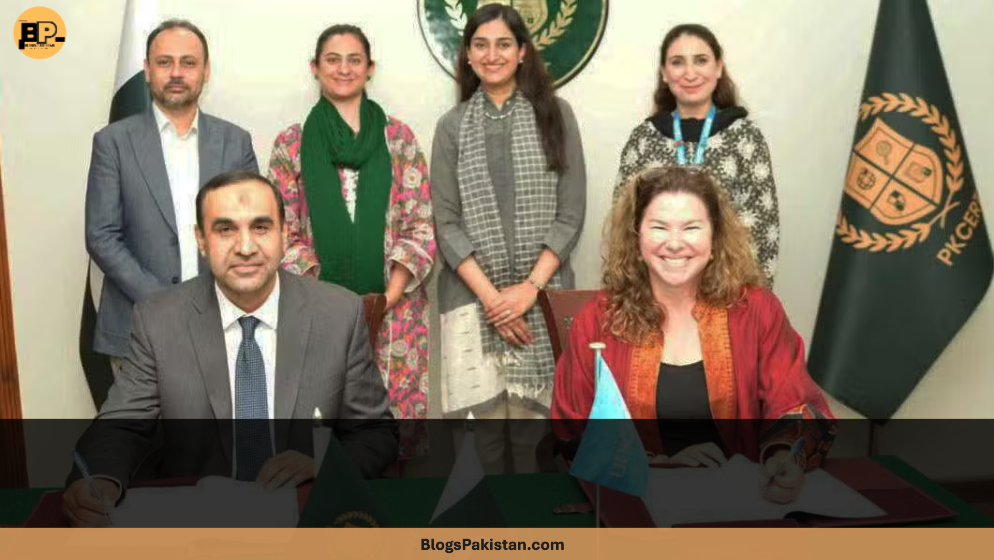Introduction: Cyber Safety Gets a Desi Upgrade
UNICEF : Let’s face it: if you’ve ever had to chase a 10-year-old away from suspicious YouTube videos or mysterious mobile games, you know the internet is a jungle. For kids in Pakistan and India especially, online spaces can be as wild as a Karachi bazaar on Eid morning. But here’s some good news: Pakistan’s National Cyber Emergency Response Team (National CERT) and UNICEF Pakistan have just dropped a digital safety bombshell! They’ve signed a Memorandum of Understanding (MoU) to shield our youngest web surfers from cyber dangers.
This isn’t just a paper-pushing pact. It’s a promise to make the internet safer, smarter, and just a bit less scary for millions of children across the country. Ready to find out how? Let’s pull back the digital curtain.
Why Does Child Online Protection Matter?
In today’s world, children are growing up in a digital-first environment. From online classes to TikTok dances, their lives are increasingly tangled with the internet. While the digital world offers fantastic opportunities, it also comes with a dark side—think cyberbullying, predators, online scams, and exposure to inappropriate content. For parents in Pakistan and India, the phrase “online safety” can spark as much anxiety as a lost Wi-Fi signal during a cricket match.
This is where the focus keyword for today comes in: Child Online Protection in Pakistan.
The Dynamic Duo: National CERT and UNICEF Join Forces
So, what exactly did National CERT and UNICEF do? They didn’t just shake hands for a photo op. They signed an MoU that brings together the brainpower of cybersecurity experts and the child-focused strategies of UNICEF. This partnership is all about:
- Joint Action: Launching coordinated efforts to detect and disrupt cyber threats targeting children.
- Policy Dialogue: Crafting smart, effective laws and policies that prioritize kids’ safety online.
- Capacity-Building: Training parents, teachers, and even kids themselves to recognize and dodge digital dangers.
- Awareness Campaigns: Rolling out public education on everything from safe browsing to dealing with cyberbullying.
- Evidence-Based Interventions: Using data and research to guide every move, so no one’s playing digital roulette with children’s futures.
Who Was in the Room Where It Happened, UNICEF ?
The MoU was signed in classic Pakistani style—think dignitaries, strategy, and a lot of chai (probably). Dr. Haider Abbas, the Director General of National CERT, led the charge, along with key team members Syed Imran Haider and Zaheema Iqbal. On UNICEF’s side, Jennifer Melton, Farrah Ilyas, and Mahwish Saeed Syed brought their expertise in child protection and social change.
What Makes This Partnership a Game-Changer?
Unlike your average anti-virus software, this collaboration aims to go beyond patching up problems after they happen. The goal is to build a culture of cyber resilience from the ground up:
- Integrating Digital Literacy in Education: Imagine school curriculums where learning about phishing is as important as memorizing math tables.
- Community Engagement: Mobilizing parents, teachers, and even kids themselves to be digital watchdogs.
- Protocol Development: Clear, rapid response guidelines for handling incidents like cyberbullying, online harassment, or exposure to harmful content.
- Inclusive Digital Ecosystem: Ensuring that solutions reach children in rural areas, not just those in Lahore or Karachi.
Why Is This So Important for Pakistan and India?
Let’s be honest: South Asia’s digital revolution is happening fast. In both Pakistan and India, smartphones are everywhere, data is cheap, and the next generation is growing up swiping before they can write. But cybersecurity hasn’t always kept pace with the tech boom. According to UNICEF, millions of children in these countries have access to the internet, but awareness about online risks is still alarmingly low.
This initiative is not just about protecting kids from obvious threats. It’s also about empowering them to thrive online—to use digital tools for learning, creativity, and connection, without fear.
What Can Parents, Teachers, and the Community Do Next?
If you’re reading this and wondering “What now?”, don’t worry. Here are some quick tips to get started on your own child online protection journey:
1. Start the Conversation Early (and Often):
Don’t wait for a crisis. Talk to your kids about internet safety as soon as they start using digital devices.
2. Set Some Boundaries:
Establish rules about screen time, appropriate websites, and sharing personal info online.
3. Stay Informed:
Keep up with the latest trends in cyber threats. If your child mentions a new app, Google it before they download.
4. Use Parental Controls:
Most devices and apps have built-in safety features. Learn how to use them—your digital peace of mind depends on it.
5. Encourage Reporting:
Let your children know they can come to you if something online makes them uncomfortable. No judgment zone!
6. Get Involved at School:
Advocate for cyber safety lessons and workshops in your child’s school.
Looking Ahead: The Future of Child Online Safety in South Asia
With the groundwork laid by National CERT and UNICEF, the hope is that Pakistan becomes a regional leader in child online safety. Ideally, these strategies will be so successful that neighbors (yes, even India) will be inspired to implement similar programs.
Cyber threats will continue to evolve, but so will our defenses—especially when collaboration, innovation, and a dash of community humor are in the mix.
Final Thoughts: Making Digital Childhoods Safer—Together
The internet isn’t going away, and neither are its challenges. But by joining forces, Pakistan’s National CERT and UNICEF are showing that a safer, happier, and more empowering digital future for South Asian children is possible. As parents, educators, and community members, we all have a part to play—because protecting kids online is truly a team sport.










